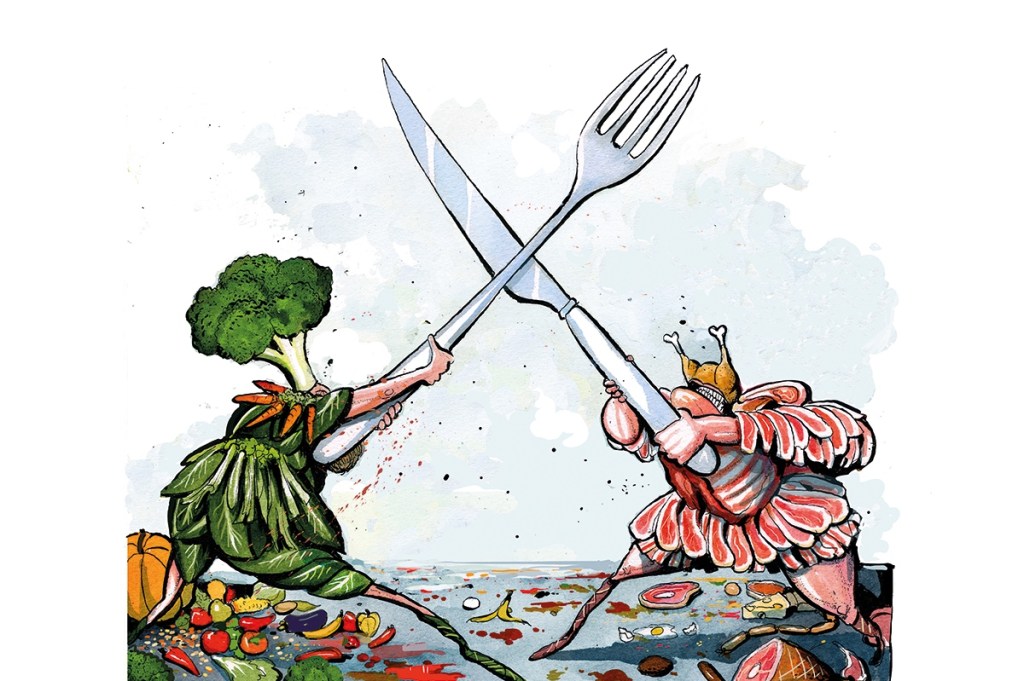While most Americans kick off the holiday season with warm cider and festive sweaters, denizens of the commentariat have a more insufferable tradition.
Each year, in the days leading up to Thanksgiving, columnists everywhere bombard readers with condescending guides to fighting with “difficult” (read: Republican) relatives over the dinner table. Most of us simply roll our eyes or lampoon these unbearable screeds, while others call for civility. Writing for this publication earlier this month, Mary Katharine Ham made a refreshingly reasonable “case against the Thanksgiving dinner fight.”
This is partially right. While you shouldn’t bring up politics or be otherwise priggish for the sole purpose of derailing Thanksgiving dinner, we should want our holiday celebrations to have a little back-and-forth. With the exception of conflict-averse WASPs who anesthetize themselves with turkey trots and Chablis, most families find themselves at festive loggerheads at least once a year. Our goal shouldn’t be to stifle those scuffles, but to have a little fun with them.
After all, familial dysfunction is an inherent part of the holidays that bring us together in the waning of the years. We all understand this on some level. That’s why The Bear’s Christmas episode — a star-studded, anxiety-inducing snapshot of Chicago’s most messed up family — was everyone’s favorite, and instantly achieved classic status. Indeed, all the best Christmas movies are, if you think about it, centered around families trying to figure it out.
Elf is the story of a miserable workaholic and his sons fighting to figure each other out. The greatest Christmas movie of all time, White Christmas is about sisters and brothers prodding and manipulating each other all the way to December 24, almost ruining several romantic and familial relationships (and at least one business) on the way.
The dysfunctional family dynamic is such an essential part of the Christmas canon that director Thomas Bezucha tried to capture it in his 2005 film The Family Stone, which ultimately fails because, beneath their frenetic exterior, the titular family is actually, obnoxiously, perfect.
We gravitate to these movies because they’re relatable. Because we all appreciate that, as Elaine Stritch declares in a 30 Rock Christmas special dedicated to this very subject, after ten minutes of pressure, even the most seemingly loving family will be “tearing at each other like drag queens at a wig sale.”
That’s the secret to a successful holiday fight — anticipation. Like politics, family matters are best conducted when everyone remembers that men are not angels. When you come to the table aware of the fact that you and your cousins share similar personalities but different views — on politics, on religion, on who really won that touch football game in ’07 — you’ll be less surprised when barbs get passed around with the stuffing.
Once prepared, you can absorb, deflect, or even return these provocations without getting too heated. And you’ll manage to have some fun, too. Because, let’s face it: these are people you’ve known your whole life, but only see a few times each year. Once you’ve gotten through “how’s work?” and “how bout ’dem Yankees?” you’re going to need to talk about… something. And unless you want to spend three hours talking about the dining room wainscoting, you’re going to wind up in a conversational minefield.
Fortunately, those fraught topics can be interesting — there’s a reason why we spill so much ink on them — and the heated conversations we have could even, with time, turn into cherished family memories. Matt Labash recalls a Christmas when his mother chucked a Bible at her brother’s head amid a heated theological debate. Hardly something from a Hallmark movie, but, to hear him tell it, one of his most cherished Christmas memories.
Familial dysfunction is not an excuse for political grandstanding or a flaw in need of repression. It’s just something that happens. The key is to simply to enjoy it, and understand that those itchy moments are blessings in their own way.
We’re lucky to be able to spend these moments with people we love, with whom we share so much, even if we agree on so little. It means our families contain multitudes, and holiday disagreements are a testament to the fact that, no matter how much we grow apart on any number of levels, we still find the time to get together, putting the one big thing that absolutely unites us over the many smaller things that threaten to divide us.


























Leave a Reply